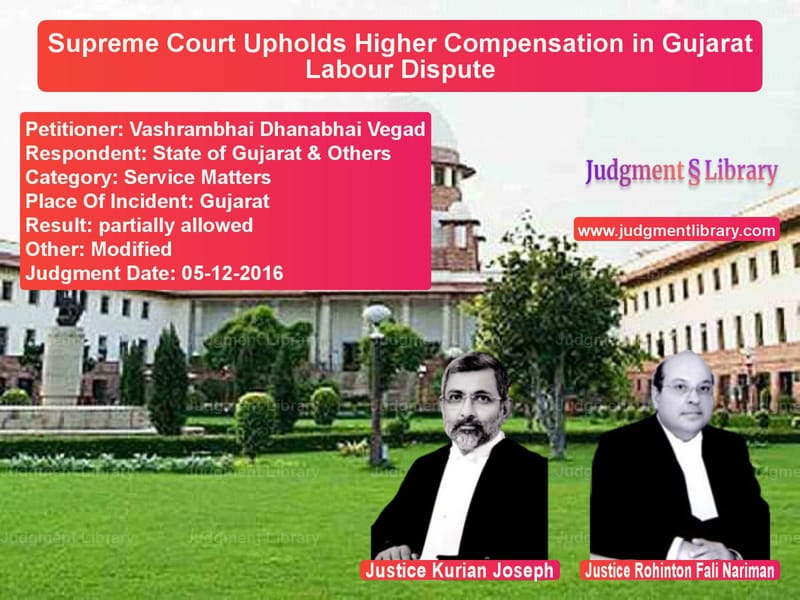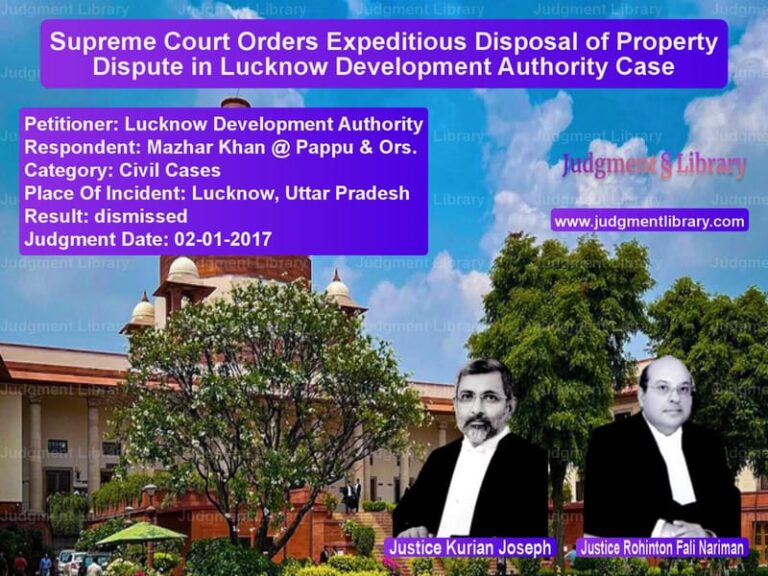Supreme Court Upholds Higher Compensation in Gujarat Labour Dispute
The Supreme Court of India, in its judgment dated December 5, 2016, in the case of Vashrambhai Dhanabhai Vegad vs. State of Gujarat & Others, ruled on a crucial labour dispute concerning an employee’s reinstatement and compensation. The case revolved around whether a terminated worker should be reinstated or awarded monetary compensation instead.
Labour disputes in India frequently involve questions of unfair termination, reinstatement, and compensation. The Supreme Court’s decision in this case clarifies the circumstances under which reinstatement is not considered appropriate and instead, a financial settlement is deemed just and proper.
Background of the Case
The appellant, Vashrambhai Dhanabhai Vegad, was a worker who had been employed by the State of Gujarat intermittently for over twenty years. The Labour Court had ruled in his favor, ordering reinstatement with 20% back wages. However, the State of Gujarat appealed against this decision in the High Court, which overturned the Labour Court’s order and instead awarded the worker a lump sum compensation of ₹50,000.
Dissatisfied with the compensation amount, the appellant approached the Supreme Court, seeking either reinstatement or higher compensation.
Legal Issues Considered
- Whether reinstatement was the appropriate relief for the appellant.
- Whether the compensation awarded by the High Court was just and fair.
- What amount would constitute reasonable compensation given the appellant’s long service?
Arguments of the Petitioner (Vashrambhai Dhanabhai Vegad)
- The Labour Court had rightly awarded reinstatement with back wages, considering his twenty years of service.
- ₹50,000, as awarded by the High Court, was inadequate given his years of service.
- Termination was unfair, and he should either be reinstated or given adequate compensation.
Arguments of the Respondent (State of Gujarat)
- Reinstating the appellant after so many years would not be practical.
- Labour Court’s order was excessive, and the High Court had rightly modified it.
- A reasonable lump sum compensation, rather than reinstatement, would be appropriate in the circumstances.
Supreme Court’s Judgment
The Supreme Court, comprising Justice Kurian Joseph and Justice Rohinton Fali Nariman, ruled in favor of increasing the compensation and made the following key observations:
- While reinstatement was not the appropriate remedy, the compensation awarded by the High Court was too meager.
- The appellant had worked for twenty years, though intermittently, and deserved higher compensation.
- The Court set aside the High Court’s order of ₹50,000 and instead directed the State of Gujarat to pay the appellant ₹5,00,000 (Five Lacs).
- The amount was to be paid within two months. Failure to pay within this period would attract an interest rate of 12% per annum.
- The Court clarified that this decision was made considering the peculiar facts of the case and should not be treated as a precedent.
Analysis of the Judgment
The ruling reaffirmed the principle that while reinstatement is the preferred remedy in wrongful termination cases, it may not always be practical, particularly when an employee has been out of service for a long period. Instead, the Court emphasized the importance of awarding fair and just compensation in such cases.
The Court took into account the appellant’s long service history and acknowledged that a mere ₹50,000 was insufficient given the circumstances. By awarding ₹5,00,000, the Court ensured that the appellant received adequate financial relief while also acknowledging that reinstatement was impractical.
Key Legal Takeaways
- Reinstatement is Not Always the Best Remedy: In cases where reinstatement is impractical, higher compensation may be a more suitable alternative.
- Fair Compensation for Long Service: Employees who have served for extended periods deserve compensation that reflects their service history.
- 12% Interest on Delayed Payments: The ruling set a strong precedent that if compensation is not paid within the stipulated time, a high-interest penalty can be imposed.
- Judicial Discretion in Labour Cases: Courts have the authority to modify compensation amounts based on the circumstances of the case.
Conclusion
The Supreme Court’s ruling in Vashrambhai Dhanabhai Vegad vs. State of Gujarat is a landmark decision in labor law, reinforcing the principle that compensation must be just and fair. While reinstatement remains the preferred remedy in wrongful termination cases, this ruling underscores that monetary compensation can be an alternative where reinstatement is impractical.
By increasing the compensation from ₹50,000 to ₹5,00,000, the Supreme Court ensured that the appellant received a fair remedy for his long service. This judgment is expected to guide future labor disputes, ensuring that workers are not left with inadequate compensation after wrongful termination.
Don’t miss out on the full details! Download the complete judgment in PDF format below and gain valuable insights instantly!
Download Judgment: Vashrambhai Dhanabha vs State of Gujarat & O Supreme Court of India Judgment Dated 05-12-2016.pdf
Direct Downlaod Judgment: Direct downlaod this Judgment
See all petitions in Employment Disputes
See all petitions in Judgment by Kurian Joseph
See all petitions in Judgment by Rohinton Fali Nariman
See all petitions in partially allowed
See all petitions in Modified
See all petitions in supreme court of India judgments December 2016
See all petitions in 2016 judgments
See all posts in Service Matters Category
See all allowed petitions in Service Matters Category
See all Dismissed petitions in Service Matters Category
See all partially allowed petitions in Service Matters Category







